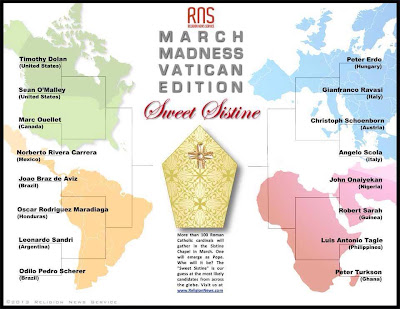Tomorrow, the cardinal electors will begin the Papal
Conclave and vote once. If nobody is chosen, they have four ballots for the
Wednesday and Thursday. If nobody has been picked by the ninth ballot, then
after a day of reflection, voting resumes on Saturday.
But there are several things we have to understand about the Conclave that we as Catholics must acknowledge:
1. This is not like a presidential
election: Sure, we all have fun with the betting, and fun memes like this
one.
Keep in mind, though, that nobody expected “the Pole” in 1978, an unknown Polish archbishop (who was not a part of the Roman Curia) by the name of Karol Wojtyla. Notice how the correspondents are having trouble pronouncing his name (not something they would have trouble with if he was considered a candidate by the media).
2. This is not like a presidential election! Let me explain, since I just said made this point, but there’s another point to this. A lot of reporters are suggesting that the cardinal electors maybe pick somebody who will be change some core teachings of the faith (such as the ordination of women, or contraceptives and abortion). Let’s be clear here: as Catholics we believe that the Holy Spirit is present — that Christ will keep his promise that He will not let the Church fall. Even if a pope of questionable moral character is elected (like we may have seen during the Middle Ages), the deposit of faith will be kept and we will not be led astray.
When the cardinals vote, they state before the altar: “I call on the
Lord Jesus, who will be my judge, to witness that I am voting for the one I
believe to be worthy,” something described by Cardinal Wilfrid Napier of Durban,
South Africa as frightening and intense, acknowledging that if he votes for unworthy
reasons, “I am actually asking Jesus to judge me / condemn me, so it’s a very
solemn moment.” The quote is at 2:40.
3. They are sworn to secrecy: Don’t be expecting these guys to be live-blogging and tweeting during this conclave (even though several already keep blogs). To really be open to the Holy Spirit, the cardinal-electors rid themselves of outside influences (including the internet), similar to a jury for an ongoing trial. We can’t know what’s going on in there, and they can’t know what’s going on out here.
3. They are sworn to secrecy: Don’t be expecting these guys to be live-blogging and tweeting during this conclave (even though several already keep blogs). To really be open to the Holy Spirit, the cardinal-electors rid themselves of outside influences (including the internet), similar to a jury for an ongoing trial. We can’t know what’s going on in there, and they can’t know what’s going on out here.
 |
“The Vatican prohibits the use of Twitter during the Conclave.”
“Let me in! I’m not Twitter, I’m the Holy Spirit!” |
5. A
pope cannot change dogma: Certain
things, like liturgical practices and disciplines, are subject to change, and
after much prayer, the pope can implement such changes. For example, Blessed Pope
John XXIII convened the Second Vatican Council, which allowed for the Mass to
be celebrated in the vernacular, and Blessed Pope John Paul II established the
Pastoral Provision allowing married pastors of Anglican communities (and in
some rare cases, other Protestant traditions), to be ordained to the Catholic
priesthood. Other things, such as the ordination of women (which the Church
simply does not have the authority to do), or abortion (which by definition, is
always intrinsically evil, regardless of the reason). So let’s again pray that
God’s will is done in this election, and rather than be disappointed if someone
we don’t agree with is elected, let us thank Him for giving us a shepherd, and
delve deeper into the Church’s teachings to understand what it is that we don’t.
So
with all that, let’s pray this week for the Cardinal-electors, for the
Conclave, for the Church, for Pope Emeritus Benedict XVI in his retirement, and for
ourselves, that we may also take this opportunity to grow in love of Christ and
his Church.



No comments:
Post a Comment